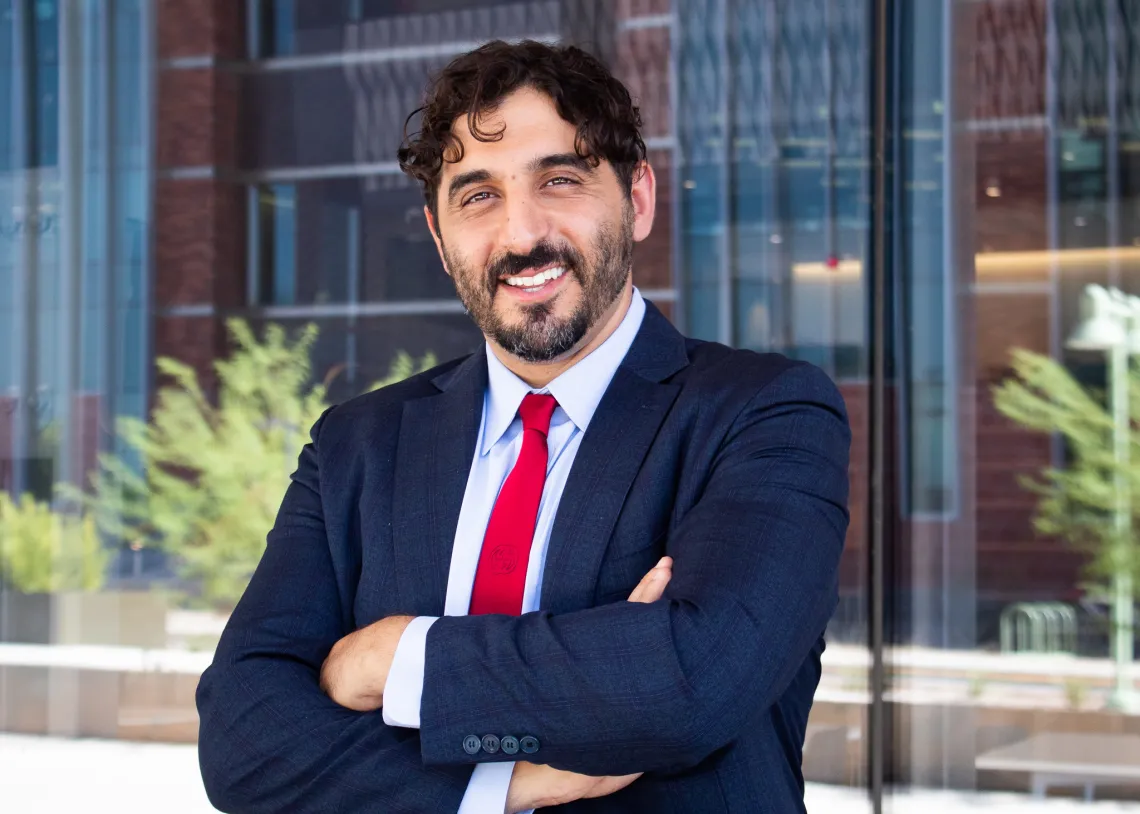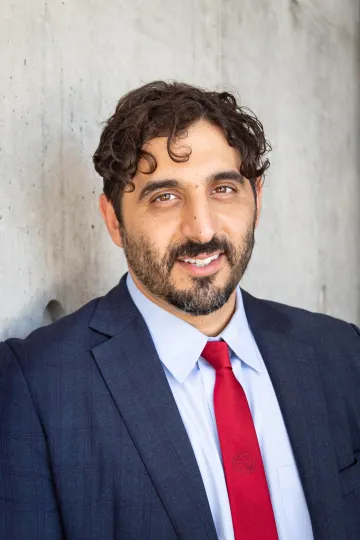Diversity and Inclusion Spotlight: Dr. Bellal Joseph

Dr. Bellal Joseph is a tenured professor with and chief of the Division of Trauma, Critical Care, Burn, and Emergency Surgery. He is also vice chair for knowledge expansion and director of the International Research Fellowship program.
Where are you from?
I‘m originally from Maumee, Ohio. I‘m a first-generation American. My parents migrated to the United States from Lebanon, so I grew up culturally Lebanese in an American society. It was quite interesting to be raised as a first-generation American.
What brought you to Tucson?
When I finished training in my fellowship, I was looking for a job, and there was a great opportunity here to be part of building the Level-1 Trauma Center. At the time, we still weren’t established, and the program was building. It was a diverse group of people here who were looking for another partner, and that’s when I joined. I never thought I‘d live west of the Mississippi growing up. All of my family and friends are east of the Mississippi.
A funny little story: at the time, I wasn’t married, and instead of bringing my significant other for my second visit, I brought my mom and dad, because I had to get the parents approval to move out here. Dr. [Peter] Rhee, [the chief of Trauma] at the time, who was Korean, understood the culture. So, he flew them out here as part of the visit and took my dad out to dinner. And actually, he tells the story of how he basically accepted from my dad that he was taking responsibility for me if I were to come out here. It’s kind of funny as a grown 30-year-old that I still needed permission from my dad to move out here, but that’s what brought me out to Tucson. Dr. Rhee was the only one from all of my job interviews who actually understood the culture and had that happen.
What does diversity and inclusion mean to you?
Growing up in small-town, Midwestern America, I didn’t really understand it, and then even going into surgery as a profession. But in the last three or five years, I‘ve finally understood as there’s been more attention on the national level of what diversity really is. It’s really opportunity. It’s fair opportunity, where you‘re not judged based on your culture, your religion, your race, your ethnicity. It’s just a nonbiased fairness that’s based on your qualifications rather than what you represent and who you are by birth or by color or by sexual determination, etc.
What are some of the obstacles you‘ve had to overcome on your journey?
I‘ve been written up for speaking Arabic with another coworker who spoke Arabic. I had to go to HR, and we were accused of causing harm to a patient because I spoke Arabic, even though it had nothing to do with the case. This was after I was an attending. I've been called a terrorist by patients many times because of my Arab origin. I‘ve seen being a Muslim in America change since 9/11; I‘ve seen my family attacked, things said to me on rounds by patients. This is a very sensitive subject to me, actually.
I‘ve had professors tell me many times that I would never make it to medical school. That’s the in-your-face bias that happens. And there’s no excuses; hard work makes all the difference. But I think having people give special attention to you makes it a lot harder. The other part of that is the imposter syndrome that develops within you. Where, in your mind, you always feel like you‘re never good enough or you‘re never able to do things, no matter how hard you work and all the things you accomplish. And really, it’s that imposter syndrome that makes you very uncomfortable.
And more implicitly, there are all of these Funny jokes people even your friends make where they think they‘re just trying to make light, but they don’t realize that deep down there’s a deeper meaning and these jokes are part of the bias.
But, overall, it’s been great since I‘ve been here. I really think diversity is part of the culture we‘ve established. Nationally, we‘ve been spending more time and energy and resources, kind of like what we‘re doing now in the Department of Surgery, to highlight these things. And that helps open up that whole thing to stop it from happening.
What strengths do you feel like your diversity has given or taught you?
I live every day by the principles I was raised on by my parents. You know, you carry those things. And I think having the ability to have traveled and seen the world, the origin of where my parents come from, and see how other societies live, suffer, and deal with things, we realize how blessed we are to be here in the United States and receive the medical care we get here.
I also think it’s motivated me to work harder to prove myself. There’s like a weird motivation where, when you show up and you feel you‘re entitled to something, it’s very different from when you show up and you‘re not part of it. It makes you work hard to get where you need to be.
What is the importance of diversity and inclusion in surgery?

I really think that it's critical that we give the same opportunities promotion, leadership to everyone. The subconscious bias of the jokes to our female colleagues or minority colleagues...people don’t realize the impact of that until they're actually a victim of it. What [bringing more awareness to diversity and inclusion] is doing for us is allowing us to be able to stand in front of everyone and say, It’s not ok. It’s not alright to do these things. The most important thing is, as newer generations come into our field, they see the field as a safe zone. And that’s really what I think makes all the difference. There have been many times where I didn’t put myself forward for things because I knew or I felt maybe it wasn’t true but I felt, that I wasn’t accepted or I wasn’t part of it. So being open and in tune to it allows more diversity in who comes into the field, who approaches medicine, and how we learn from those people.
How do you hope to see the field of surgery become more diverse and inclusive?
I think we can talk about these things all day long, but it’s actionable items. For example, a critical thing is pay and gender gap. Male surgeons make more than female surgeons. I think it’s absurd that in 2019, this still exists. And that’s the problem: I think people now acknowledge it, but what I really want to see is action. And it’s not just about male/female or culture/race/ethnicity I think all of those are components of it. What I really want to see is the underprivileged, underserved, people who didn’t think they belong, just the same opportunity not more as anyone else to get to whatever their dream may be and not be hindered because of the color they are or who their parents are or what religion they practice.
We actually completed an initiative recently where we looked at all the salaries within the department and made sure that female salaries and male salaries were equivocal. We made a conscious effort to fix that. There’s no pay gaps. In my division, three out of my four recruits were female. I think that makes a better team. There’s a lot of those things that we didn’t have before that we‘re actually doing now. It’s a reset in the way we think, a total reset.

